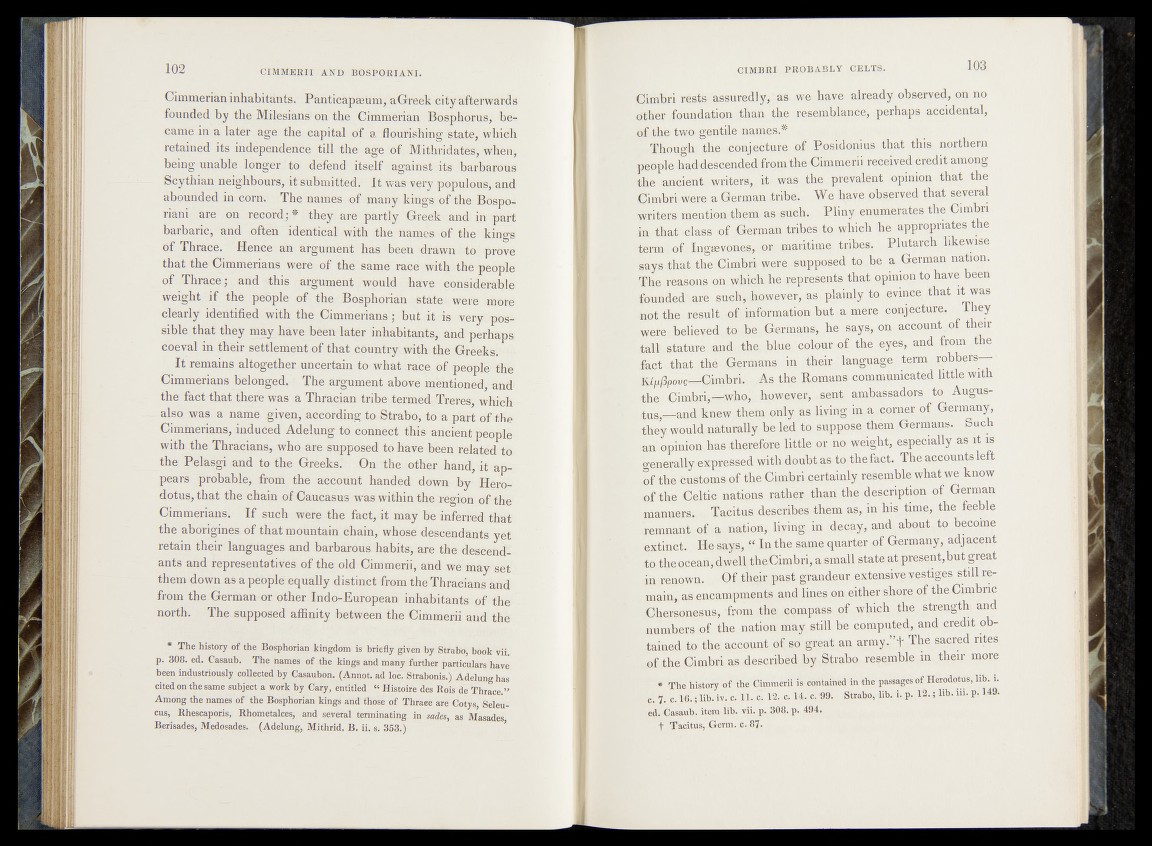
Cimmerian inhabitants. P anticapænm, a Creek city afterwards
founded by the Milesians- on, the Cimmerian B'osphorus, be-?
came in a later age the capital of .a flourishing sj&te, w'hidh
retained its independence till the age of Mithridatps, when-
being unable longer to defend itself against ntS'barbayoiM
Scythian neighbours, it submitted. I t was very papulous, and
abounded in eorm The names o f many kingstef the Bdgp&ç
riani are on record;* they are partly Creek and in part
barbaric, and often identical with the names of the kings
of Thrace. Hence an argument has been drawn to prövë
that the Cimmerians were of the same race with the people
of Thrace; and 4his argument would have considérable^
weight if the people of the Bosphorian state werë mor©
clearly identified with the Cimmerians ; but it is very pos-!
sible that they may have béen later inhabitants, anâ.perhaps
eoeval in fheir settlement of that country with the Greeks.- >-<
I t remains altogether uncertain to what .race of people the
Cimmerians belonged. The argument above mentioned,- and
the fact that there was a Thracian tribe termeeUTreres, which '
also was a name given, according to Strabo, to a part o f the
Cimmerians, induced Adelung to connect this ancient people
with the Thracians, who stte supposed to have been related to
the Pelasgi and to the Greeks.' On the. other hand, it appears
probable, from the account handed down by . Herb-1
dotus, that the chain of Caucasus was within the region of the
Cimmerians. I f such were the fact, it may be inferred that
the aborigines of that mountain chain, whose descendants yet
retain their languages and barbarous habits, are the descend
ants and representatives of the old Cimmerii, and we may set
them down as a people equally distinct from the Thracians and
from the German-or other Indo-European inhabitants of the
north. The supposed affinity between the Cimmerii and the
* The history of the Bosphorian kingdom is briefly given by Strabo, book vii.
p. 308. ed. Casaub. The names o f the kings and many further particulars have
been industriously collected by Casaubon. (Annot. ad locTStrabonis.) Adelung has
cited on the same subject a work by Cary, entitled “ Histoire des Rois de Thrace.”
Among the names of the Bosphorian kings and those of Thraee are Cotys, Seleu-
cus, Rhescaporis, Rhometalces, and several terminating in sades, as Masades
Berisades, Medosades. (Adelung, Mithrid. B. ii. s. 353.)
Cimferi rést&iassuredl'yjcRS^e have already observed, on no
other foundation than- ^ e ^ e ^ l^ a n c g , perhaps accidental,
©fithe
»(Though th,ei>conjecture, Posidonius, ttifrt this northern
foople h a d ^ sW n d e d ^ ^ f r ê ^ im m e r p ^ y é d credit among
the ancient Pr# ^ ^ p i » ® that the
•Clmbriiwere- , We have ^ e ^ y e d '
w rite r p j c u t id n ^ f l ^ ^ u e b . P l i | f enumerates t l ^ im b n
% that t i^ ^ |Q . whiqh he appropriates,the
termftof G f l S B H n maritime .?lut^rch likewise
says thafethe Cimhiji f #e«-si|pp©§e,d^t(^ be ,
Thc-t^sous,o$^ which-he that
riot, the result of. jnfofi^ation but : ^
feere-believed ^eir
yaahv^atujew-and the, b l ||| cofrpr of
Jjact that tbè t<^roans#,M ®^bers__'
Homans communicated little;with
—who,' howeypj|^s<30»t\ ambas^icl^s..j|q AugWM‘
U!S,-^an4 Anew tfiepi. only as^jif^g' te. of f | | r™an^ ;-,
&fey,wo^r>d naturally be led, to.,suppose- them mans^Such
-an opinion||a6thorefqrejittlepr^$yeigbt|^pecially asu-t is
ugenprally expressed wi%dpubt,RS to thefact. The gccpnn|s left
» f tbnib4fW-S,pfdheflQjmbri certainly ,r#emblp what^e.knpw
; p f the {peltte nations rather than »^ erman
, -manneg Tacitus, describes them as, in his^imp^ the feeble
remnant nation;, liyingJn decay, andabqut to become
extinct. He says, “ In the^nxe. quarter qf _Qermany,,adjacent
to theo.ee,an; d.well thpCimbri,a-small ^ate^t.present, but gr|at
in renown., ',Qf th^r past grandeur e x t e n s iy ^ ^ g ^ atill i|g.
. main, as encampments and line^pn eijher^bo^|)f thpCimbric
-Chersonpsus, 'from the compass- p f which the |trengtb^ and
numbers of the nation may still be computed, and credit obtained
to the account pf so great an army^.t The sacred rites
.of the Cimbri as described by Strabo resemble their more
* The history of the Cimmerii is contained in d ie passages of Herodotus, lib. l.
c. 7. c. 16.; lit. iv. c. 1 ^ 1 2 . j j 14. c.'99. Strabo, lib. i. p. 12.5 lib. in- P-149-
ed. Casaub. item lib. vii. p. 308. p. 494.
' t Tacitus, Germ. c. 87.